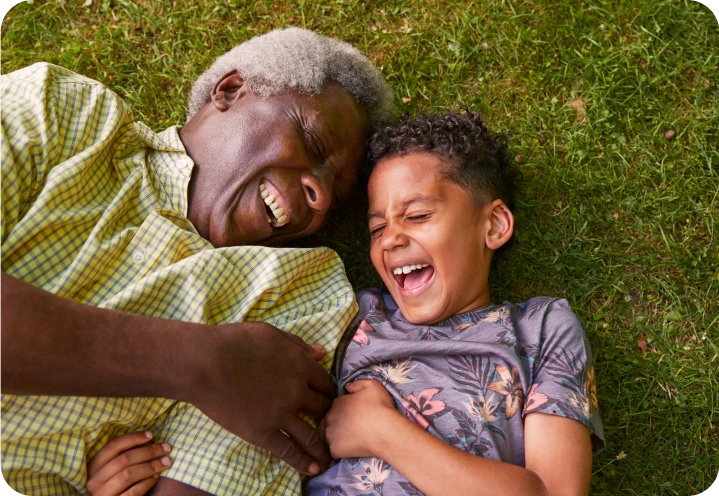How Research Works
Joining A Greater Cause
Every available medicine or treatment today was once a clinical trial; everything from headache medicine to acid-reflux pills to chemotherapy medications. Whether you are seeking a new treatment option or an opportunity to help others, participating in a clinical trial could benefit you, your community, and generations of people to come.
By joining Future of Medicine, you’ll be taking the first step to joining something bigger: a community of like-minded people who are actively taking control of their health and helping future generations by their participation in research.
Joining does not necessarily mean that there will be a clinical trial that is right for you. Nor does it mean that you are obligated to participate in clinical trials offered to you. The decision to opt in or out of specific research is always up to you.
Hear from Future of Medicine members
What Is a Clinical Trial?
Clinical trials, clinical research, and clinical studies all mean the same thing. A clinical trial is a type of research that studies new potential treatments, tests, and ways to prevent disease. So what does the headache medicine in your cabinet, the latest cancer treatment, a flu shot all have in common? They all relied on people who chose to participate in a clinical trial.

Advance Science and Improve the Lives of Others
By joining a clinical trial, you will play a critical role in helping doctors and scientists find better ways to identify, prevent, and treat disease. Your involvement in a clinical trial directly contributes to advances in medical knowledge that can benefit other people facing similar health conditions in the future. Together, we can help more people live longer and healthier lives.
Benefits of Clinical Trials
Participating in a clinical trial is a contribution to the well-being of future generations, but it can also be beneficial to you. In a clinical trial, participants may receive new treatments that are only available as part of the trial. Furthermore, participating in a trial could have other benefits like increased health awareness and additional monitoring by clinical professionals and physicians during the trial.

Represent Your Community
Clinical trials help us learn how well medicines work and ensure they are safe to use. Factors such as ethnicity, ancestry, age, and sex could impact how different people respond to the same medicine. That's why it is important to include people from diverse backgrounds in every clinical trial. Having a representative and diverse group of clinical trial participants helps ensure that the treatments will be safe and effective for all communities.



Research Participant Protections
Multiple safeguards are in place to ensure the safety of clinical trial participants. For one, the Food and Drug Administration (FDA) oversees all clinical trials testing new treatments. In addition, an Institutional Review Board (IRB) is dedicated to protecting participants.
Your rights as a research participant
You have many rights during a clinical trial, including the rights to:
- Leave the trial at any time, for any reason
- Ask questions about any part of the trial
- Be informed on what the goal of the study is and what you can expect
- Know who will have access to information about you
- Be aware of all the risks and benefits
- Keep your identity confidential and understand how your information is being protected
The Clinical Trial Team
As a research participant, you may come across a number of people who play different roles in the study.
Clinical trials may have the following team members:

Patient Educator
A person who will meet with you before the trial begins to discuss all the details. You can ask them any questions you may have before you enroll in a trial.

Principal Investigator (PI)
This is the study doctor who is in charge of the trial. They oversee your care team and respond to any health issues that may occur during the study. PIs are fully qualified doctors who have additional training and experience in clinical research.

Clinical Research Coordinator (CRC)
A specialized healthcare professional who supports the PI in conducting research and helps you throughout the process. This is the team member you will interact with the most during and between your visits.

Sub-Investigator (Sub-I)
This is another study doctor who helps the Principal Investigator oversee your care team and respond to any health issues that may occur during the study. Sub-Is are fully qualified doctors who have additional training in clinical research. Many Sub-Is work in clinical research in addition to caring for their patients in their practice.

Patient Resource Partner
Mostly found in trials for cancer. This person can help you find financial assistance if needed. They may also help you:
- Navigate copays and secure funding for regular drug costs.
- Find need-based financial assistance for non-medical expenses, like childcare, pet care, or rent and utility assistance.
- Arrange transportation if you need help getting to your study visit.
- Remember what you need to do for the study and remind you with follow-up calls.
The Phases of a Clinical Trial
Clinical trials typically go through a number of phases, each serving a specific purpose. Understanding the phase of the trial you are being invited to participate in could be very important in helping you determine if that trial is right for you. Here is an overview of the different phases of a clinical trial.
Most of the clinical trials that Care Access offers are Phase 3 trials, which means the potential new treatment has already been tested in earlier phases by other groups of people. In Phase 3, the study drug has already been successfully tested by a small number of participants in the earlier phases for safety, effectiveness, and side effects, and is now ready for a larger number of participants to test it before it can be approved for everyone.
Phase 3 trials are the largest and usually the longest stage. At this point, the potential new treatment has already been tested on many groups of people, for years.
In essence, you are one of many participating in a clinical trial — and your involvement matters, both for you and your community.
Interested in Potentially Participating in a Clinical Trial?
Get a health screening and see if you qualify for a clinical trial.
Clinical Trial FAQs
We work together with regulatory agencies to ensure that your safety as a participant is the top priority, and any potential risks will be shared prior to you agreeing to join a study. Every clinical trial is regulated by the Food and Drug Administration (FDA), and then reviewed, approved, and watched over by an independent group of doctors, researchers, and members of the community called the Institutional Review Board (IRB). Together, we ensure your rights, safety, and wellbeing are protected.
While any medical treatment involves some risk, every clinical trial has a detailed plan reviewed by many experts to make sure it is as safe as possible. When you participate, you are protected from any unnecessary risk.
Experts from federal health agencies and the Institutional Review Board (IRB) must review and approve all trial plans. They will not approve a trial plan if the potential risks to a participant are too high. Any potential risk must be explained to you during the informed consent process before you agree to be in a clinical trial. Doctors will monitor your health throughout the trial, and you can leave the trial at any time for any reason.
Every clinical trial is led and supervised by doctors, who we call Principal Investigators and Sub-Investigators. If you have a regular doctor, you can continue to see them as usual.
No, you don’t need health insurance to participate in a clinical trial.
In a clinical trial, there are usually no costs for tests, doctor visits, and treatments related to the study.
Typically, you will be paid for your time and any travel expenses when you participate in a clinical trial. You may also get assistance in identifying and enrolling in financial assistance programs, for those who qualify.
Some trials only require short visits every few weeks, while others may include weekly visits or even overnight stays. We’ll let you know how many visits and the length of time required to complete the trial before you sign up, so you can decide if the trial fits into your schedule.
Yes, even after you enroll, you can leave a clinical trial at any time, for any reason.
In a clinical trial, you may receive care and treatments related to the study, like doctor visits, tests, and medications.
Every trial has specific criteria for eligibility. The trial team will determine whether or not you meet those criteria.
There are many reasons to join a clinical trial. Joining a clinical trial could be a great way to learn about your disease or condition, it may give you access to new investigation treatments and additional medical attention from the study care team who can provide additional tests, check-ins, and follow-ups at no cost to you. For many, joining a clinical trial is about helping researchers find new ways to prevent or treat disease and to benefit future generations.
You have many rights during a clinical trial, including the rights to:
- Leave the trial at any time, for any reason
- Ask questions about any part of the trial
- Be informed on what the goal of the study is and what you can expect
- Know who will have access to information about you
- Be aware of all the risks and benefits
- Keep your identity confidential and understand how your information is being protected
Every clinical trial has requirements, called eligibility criteria, that will either include or exclude you from being able to participate in a trial. The study team will let you know if you are eligible to participate in a trial. If you don't qualify for one trial, you may still qualify for a future trial.
A placebo is a pill or other substance that looks like an active treatment but doesn’t have any actual treatment in it. It could be a sugar pill or a tablet that contains the same ingredients as the potential new treatment, except for the active ingredient.
Placebos are only used when receiving a placebo would not be dangerous to anyone in the study, and are never used if it would put someone at risk by not allowing them to have effective medicine. You’ll only be considered for a trial that uses a placebo when it’s safe and medically appropriate.
If a placebo is being used in the trial you’d like to participate in, you will be informed ahead of time. During the trial, you won’t know whether you receive the active treatment or the placebo. This is called blinding and is an important aspect of scientifically sound research, for certain types of studies.
Not every trial uses placebos. In cancer clinical trials, placebos are rarely used. If they are, participants who receive the placebo will not have to stop their current cancer treatment.
In any clinical trial, the kind and amount of care you receive depends on the specific study. You can ask any questions about the use of a placebo when you meet with your Patient Educator before the trial begins.
In most trials, you’ll continue to see your regular doctor. This is because most clinical trials focus on a specific medical condition and don’t provide long-term healthcare once the trial is complete.
You don’t need a doctor to participate in a clinical trial. During the trial, your care team will include study doctors as well as other dedicated nurses, medical specialists and support staff who can guide you.
Many clinical trials offer the option to maintain your existing treatment. You can discuss any current medications you are taking with the study team before you begin a trial.
Most clinical trials are designed to study the effects of an investigational treatment, so usually they will not require any changes in daily activities or diet. However, in some trials, you may have to follow a particular diet or exercise routine. The study team will discuss the requirements of a particular trial before you join.
Children’s bodies work in different ways than adults, so there is a need to test if medicines are safe and effective for children. Many children participate in clinical research, and as a result, treatment options for pediatric patients continue to improve. When clinical research involves children, parents and guardians are fully informed and involved throughout the entire process.
Yes, some clinical trials include healthy people. Healthy volunteers can help researchers understand the effects of certain treatments like vaccines.
Yes. Protecting the rights of research participants is an important part of clinical research. Laws require that researchers protect your privacy, and there is also an ethics review board that reviews all research plans. The protections for your privacy are covered as part of the informed consent process. Our staff also undergo training on how to help protect your confidential information.
We want clinical research to be available to everyone and are working with local communities and doctors to build out more locations for you to access clinical trials. If you decide to join a trial in your area, we can assist you in finding transportation to and from any visits. In some trials, home and virtual visits are available too.
Once the trial is complete, the treatment and study results are submitted to the FDA for review. If approved, the investigational treatment becomes available to those who need it.
Often participants can continue to have access to the trial drug even after the study is complete. Before you start a trial, your Patient Educator will discuss these details with you during the informed consent process.
Yes, you will be informed of the results of the trial you participate in. Without you, new treatments wouldn’t be available for others, so sharing the results helps you understand the positive impact you’ve made not only for yourself and your family, but for your community too.
